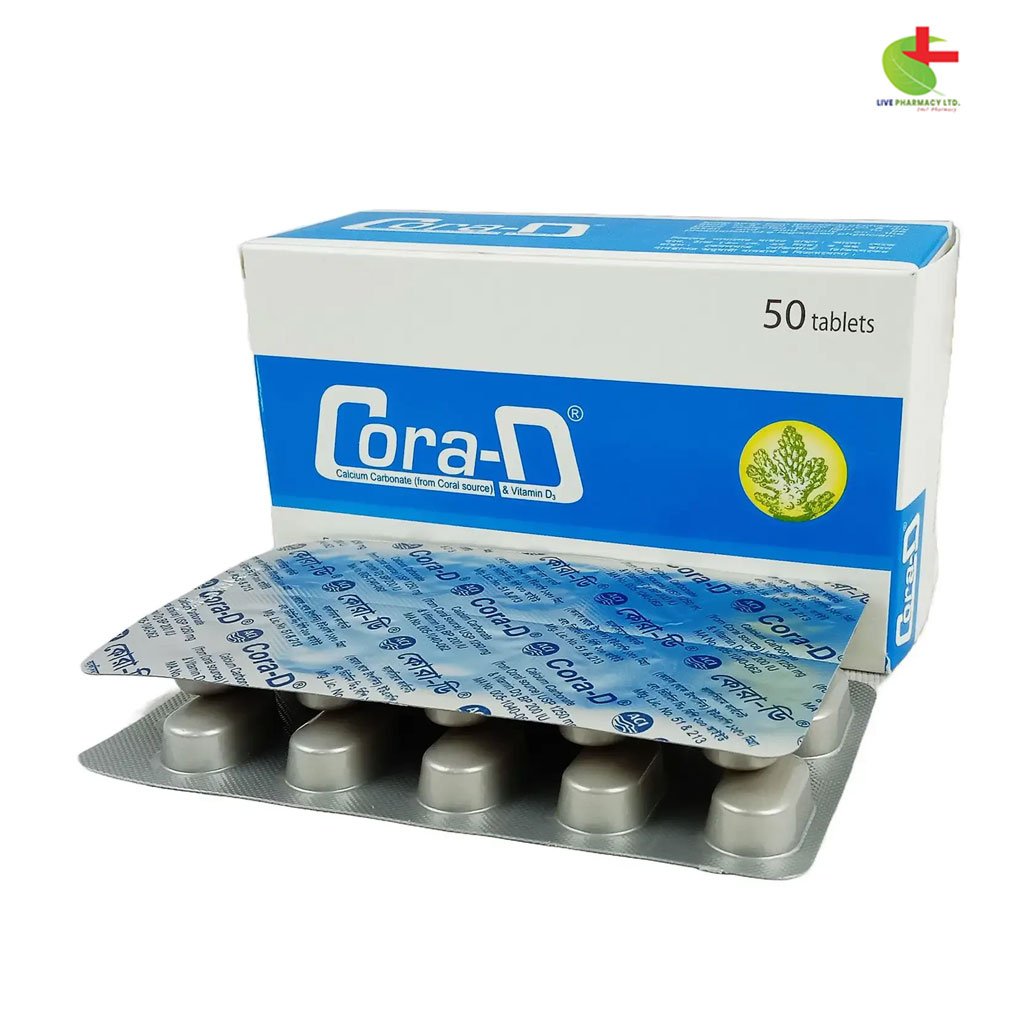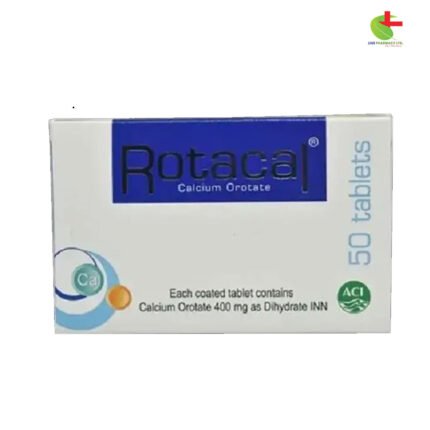Cora-D
120.00৳ Strip(10)
- Cora-D Tablet is used for the prevention and treatment of osteoporosis, osteomalacia, tetany, and other bone-related disorders.
- It combines Calcium Carbonate (from coral source) and Vitamin D3 to enhance calcium absorption and bone health.
- The tablet also serves as a supplement for calcium deficiency in children, pregnant women, and the elderly.
- It is essential for maintaining strong bones, preventing fractures, and supporting overall bone health.
 Brand
Brand
|
ACI Limited |
|---|---|
 Generics
Generics
|
Coral Calcium + Vitamin D3 |
 Type
Type
|
Tablet |
Indications
Cora-D tablets are primarily used for the prevention and treatment of:
- Osteoporosis
- Osteomalacia
- Tetany
- Hypoparathyroidism
- Osteogenesis disorders
Additionally, Cora-D tablets serve as a calcium supplement for individuals with insufficient dietary intake, including children, pregnant women, lactating mothers, and the elderly. Other clinical uses include aiding in the management of pancreatitis and acting as a phosphate binder in chronic renal failure.
Note: Always follow the advice of a registered healthcare provider when using this medication.
Composition
- Each tablet contains:
- Calcium Carbonate USP 1250 mg (Coral source), providing 500 mg of elemental Calcium & Vitamin D USP 200 IU.
- Each DX tablet contains:
- Calcium Carbonate USP 1500 mg (Coral source), providing 600 mg of elemental Calcium & Vitamin D USP 400 IU.
- Each effervescent tablet contains:
- Calcium Carbonate USP 1500 mg (Coral source), providing 600 mg of elemental Calcium and Vitamin D3 400 IU (Cholecalciferol USP).
Pharmacology
Calcium is essential for numerous bodily functions, including bone health. It is crucial for preventing and treating osteoporosis and fractures. Vitamin D is equally vital as it facilitates calcium absorption in the digestive tract and stimulates bone formation. When combined, calcium and vitamin D work synergistically to promote bone health, support growth, and prevent osteoporosis-related fractures.
In this formulation, Coral Calcium is used, which closely resembles the composition of human bone, ensuring optimal absorption. Vitamin D3 enhances calcium absorption and helps maintain balanced calcium levels in the body.
Dosage & Administration
- General Dosage: Take one tablet once or twice daily with plenty of water, or as directed by a healthcare provider. For better absorption, it is recommended to take the tablet with food.
- Effervescent Tablets: Dissolve one effervescent tablet in a glass of water and drink. Stir well before consuming, preferably with food for better absorption.
Note: Always follow the dosage prescribed by your healthcare provider.
Drug Interactions
- Thiazide Diuretics: May reduce calcium excretion, increasing the risk of hypercalcemia. Regular calcium monitoring is advised.
- Corticosteroids: Can reduce calcium absorption; a higher dose of calcium may be necessary.
- Ion Exchange Resins & Laxatives: These may reduce the gastrointestinal absorption of vitamin D.
- Tetracycline Antibiotics: Should not be taken within 2 hours before or 4-6 hours after calcium intake as absorption may be reduced.
- Cardiac Glycosides: Increased calcium levels can enhance the toxicity of these medications. Monitoring is recommended.
- Oxalic & Phytic Acids (found in spinach and whole grains): Can interfere with calcium absorption. Avoid taking calcium within two hours of consuming such foods.
Contraindications
Do not use Cora-D tablets if you have:
- Hypercalcemia or hyperparathyroidism
- Hypercalciuria or kidney stones
- Known hypersensitivity to any component of the product
- Severe kidney insufficiency
- Are undergoing digoxin therapy (requires close monitoring of calcium levels)
Side Effects
Potential side effects may include:
- GI Irritation: Constipation, nausea, or stomach discomfort.
- Hypercalcemia: Rarely caused by calcium alone but can occur with high doses, especially in those with chronic kidney issues.
- Other Reactions: Allergic reactions, irregular heartbeats, dry mouth, fatigue, skin rash, or changes in appetite.
Pregnancy & Lactation
- Pregnancy: Limit daily calcium intake to 1500 mg and vitamin D to 600 IU (15 mcg). High doses of calcium or vitamin D should be avoided during pregnancy due to potential risks to the fetus.
- Breastfeeding: Cora-D is safe for use while breastfeeding, as calcium and vitamin D pass into breast milk. Ensure additional vitamin D for the baby is administered cautiously.
Precautions & Warnings
- Regular monitoring of serum calcium and renal function is recommended during long-term use, especially in elderly patients and those on diuretics or cardiac medications.
- Vitamin D should be used cautiously in patients with kidney dysfunction, as it may not metabolize normally, leading to potential complications.
- Patients with sarcoidosis, immobilization-related osteoporosis, or a history of kidney stones should use caution. Frequent monitoring of calcium levels and urinary excretion is advised.
Overdose Effects
Overdose can result in hypervitaminosis D and hypercalcemia, with symptoms like:
- Loss of appetite, nausea, vomiting, constipation, abdominal pain
- Muscle weakness, fatigue, confusion, increased thirst and urination
- Severe cases may lead to cardiac arrhythmias, coma, or kidney damage.
Treatment: Discontinue the medication and address the symptoms with hydration, medication adjustments, and monitoring. Severe cases may require emergency medical intervention.
Therapeutic Class
- Specific Mineral & Vitamin Combined Preparations
Storage Conditions
Store below 30°C, away from light and moisture. Keep out of reach of children.













Reviews
There are no reviews yet.